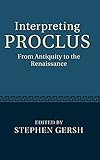Interpreting Proclus : from antiquity to the renaissance / edited by Stephen Gersh.
Τύπος υλικού: ΚείμενοΛεπτομέρειες δημοσίευσης: Cambridge : Cambridge University Press, 2014.Περιγραφή: ix, 409 σ. ; 24 εκISBN:
ΚείμενοΛεπτομέρειες δημοσίευσης: Cambridge : Cambridge University Press, 2014.Περιγραφή: ix, 409 σ. ; 24 εκISBN: - 9780521198493
- 186.4 23
| Τύπος τεκμηρίου | Τρέχουσα βιβλιοθήκη | Ταξιθετικός αριθμός | Αριθμός αντιτύπου | Κατάσταση | Ημερομηνία λήξης | Ραβδοκώδικας |
|---|---|---|---|---|---|---|
![Book [21] Book [21]](https://library.upatras.gr/nereus/nereus-book-yes.png) Book [21]
Book [21]
|
Φιλοσοφίας | 186.4 INT (Περιήγηση στο ράφι(Άνοιγμα παρακάτω)) | 1 | Διαθέσιμο | 025000186099 |
Browsing Φιλοσοφίας shelves Κλείσιμο περιήγησης ραφιού(Απόκρυψη περιήγησης ραφιών)

|

|

|

|

|

|

|
||
| 186.4 G On antecedent causes | 186.4 G The Cambridge companion to Plotinus | 186.4 GRI Proclo | 186.4 INT Interpreting Proclus : | 186.4 LLO Οι ύστεροι νεοπλατωνικοί / | 186.4 LLO The anatomy of neoplatonism | 186.4 LON Siriano e i principi della scienza |
Περιλαμβάνει βιβλιογραφικές παραπομπές και ευρετήριο.
Machine generated contents note: One thousand years of Proclus: an introduction to his reception Stephen Gersh; 1. Proclus' life, works, and education of the soul Lucas Siorvanes; 2. Proclus as exegete Anne Sheppard; 3. Proclus as theologian Stephen Gersh; 4. 'Dionysius the Areopagite' John M. Dillon; 5. The Book of Causes Cristina d'Ancona; 6. Michael Psellos Dominic J. O'Meara; 7. Eleventh- to twelfth-century Byzantium Michele Trizio; 8. Ioane Petritsi Lela Alexidze; 9. William of Moerbeke, translator of Proclus Carlos Steel; 10. The University of Paris in the thirteenth century Pasquale Porro; 11. Dietrich of Freiberg and Berthold of Moosburg Markus Führer and Stephen Gersh; 12. Nicholas of Cusa Stephen Gersh; 13. Marsilio Ficino Michael J. B. Allen; 14. Francesco Patrizi da Cherso Thomas Leinkauf.
"This is the first book to provide an account of the influence of Proclus, a member of the Athenian Neoplatonic School, during more than one thousand years of European history (ca 500-1600). Proclus was the most important philosopher of late antiquity, a dominant (albeit controversial) voice in Byzantine thought, the second most influential Greek philosopher in the later western Middle Ages (after Aristotle), and a major figure (together with Plotinus) in the revival of Greek philosophy in the Renaissance. Proclus was also intensively studied in the Islamic world of the Middle Ages and was a major influence on the thought of medieval Georgia. The volume begins with a substantial essay by the editor summarizing the entire history of Proclus' reception. This is followed by the essays of more than a dozen of the world's leading authorities in the various specific areas covered"--


